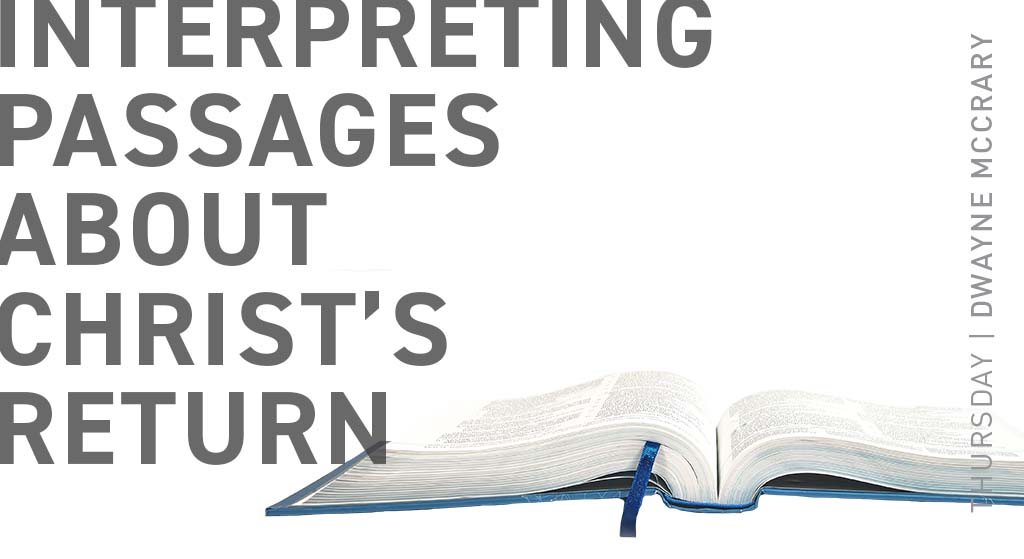While Christians agree Jesus is coming back, we can’t seem to agree on the details. Do you ever wonder why that is?
One factor is that God didn’t intend for us to know all the details. We need to be okay with that. Further, we need to be okay that we don’t agree on all the details. Another thing is that all interpreters come to the biblical text with a certain theological bias. Generally speaking, a premillennialist will interpret things more literally while an amillennialist interprets things more symbolically. Overview of major understandings
This is one of the critical questions in interpreting passages related to end-time events: How much should be interpreted literally and how much symbolically? One of the general principles of interpreting any biblical text is that a passage should be interpreted literally unless the context suggests the writer intended otherwise. An often-quoted guideline is: “If the plain sense makes good sense, seek no other sense, lest it result in nonsense.”
Are there any other principles to keep in mind when interpreting passages about the return of Christ? These four words can be our guide: context, context, context, and humility.
The Context of Genre
Take into account whether you’re reading a gospel, a letter, or the book of Revelation. While general principles of interpretation apply to all genres, each genre or type has unique features to consider. For example, Revelation features apocalyptic literature that uses bizarre symbols and figurative language to point to a reality. Here’s where good Bible study tools are useful. Sometimes, John interpreted these images for us himself (Rev. 1:20; 12:9).
Our task is a bit easier when interpreting the epistles or letters of the New Testament. Letters are more didactic in nature, straightforward, and situational—written to specific congregations to address specific situations.
Context is key. Regardless of genre type, the starting point is to discern what a book or passage would have meant to the original recipients of the book.
Historical Context
A close reading of 1,2 Thessalonians, our study for the Spring 2022 quarter, reveals specific details about Paul’s recipients and the circumstances of writing. The church was founded in midst of persecution, and that persecution continued until the time of Paul’s writing (1 Thess. 1:6; 2:14-15). Paul wrote these letters in part to encourage the persecuted congregation (1 Thess. 4:18; 5:11). His purpose was not to create a timeline of end-time events, and thus neither should that be our aim in studying these letters. Seek to understand what it meant then to understand what it means now.
Literary Context
Read the passage in light of its immediate context. Consider how it fits in the overall development of the book. Identify the main ideas in paragraphs and how the flow of thought develops from paragraph to paragraph.
Also read the passage in light of the whole Bible. Consult passages in different parts of the Bible that discuss the same thing. The Bible never contradicts itself; rather, it complements itself. Therefore, use Scripture to interpret Scripture.
In 1, 2 Thessalonians, for example, we see these connections to other parts of the Bible:
- The concept of the day of the Lord (1 Thess. 5:2; 2 Thess. 2:2)—this is rooted in the Old Testament concept of God’s intervention in history to bring about judgment to the unrighteous and deliverance for the righteous (Amos 5:18-20; Joel 1:15; Zech. 14:1-21; Mal. 4:5-8).
- The analogy of the thief in the night (1 Thess. 5:2)—Jesus used similar wording in Luke 12:38-40. Peter also used this imagery (2 Pet. 3:10), as does Revelation 3:3; 16:15.
- The analogy of the pregnant woman (1 Thess. 5:3)— Isaiah and Jeremiah used the image of labor to indicate a time of distress (Isa. 37:3; Jer. 6:24).
Humility
I mention this last though it’s of first importance and a foundational attitude of Bible study. The Bible is inerrant, without error. Yet not one of us can claim to be an inerrant interpreter. Regardless of how much experience we have in biblical interpretation, we come to the Bible as a life-long learners.
With the help of the Holy Spirit and diligent study, we can know God’s Word and teach it authoritatively. But if we ourselves stop being teachable, we stop learning and growing. Howard Hendricks said it this way: “The moment you come to a passage of Scripture and say, ‘Oh, I know this one already,’ you’re in deep trouble.”
